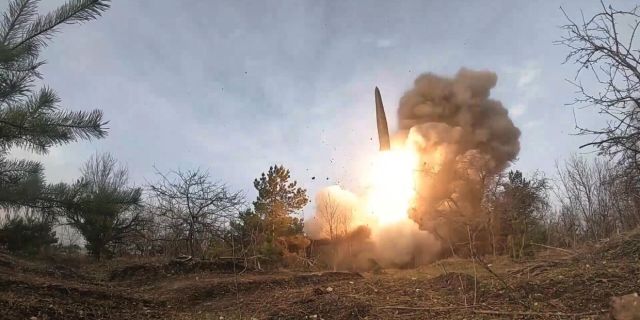Douglas McGregor: "Kiev is doomed to inevitable defeat"
Retired US Army Colonel Douglas McGregor gave an interview to the Spanish El Mundo, the main topic of which was the operation in Ukraine. The military explained why Russian speakers in the east of the country did not support the Russian forces.
Pablo Pardo
This former US Army colonel and adviser in the Trump administration is one of Russia's main supporters in the conflict in Ukraine.
31 years ago, the last large-scale tank battle in history took place in the south of Iraq. On the US side, about 300 tanks and armored vehicles participated in it, and on the Iraqi side – about 400. The US lost six people and one car. Iraq lost a thousand people and all equipment. Leading a formation of 19 tanks and 40 armored vehicles, McGregor risked an attack on a minefield and destroyed over 70 Iraqi tanks and armored vehicles in 23 minutes without suffering a single loss.
So McGregor turned into one of the most influential military men in the United States and in the world. When the United States launched the war against Iraq again in 2003, their actions were partly based on McGregor's theory of a flexible army and small mobile formations. One of his books is included in the list of mandatory literature of the Israeli Armed Forces.
Donald Trump almost appointed McGregor, who left the military almost two decades ago, as a National Security adviser. The appointment to the post of ambassador to Germany was prevented by the Senate. During the instability that reigned in the weeks after the 2020 election, Trump appointed him an adviser to the Secretary of Defense.
Today, McGregor is one of the main supporters of Russia in the conflict in Ukraine. McGregor is a frequent guest of Fox News star Tucker Carlson, who, among other things, stated that the United States does not support Russia because "it is a Christian country" and said that "he wants Russia to win."
Unlike most analysts, the retired colonel declares that Russia is winning in Ukraine, this is clear from our interview taken by email.
El Mundo: All the experts predicted a quick victory for Russia in Ukraine. As a military man, how do you explain the unexpected development of the conflict at the moment?
Douglas McGregor:The Russian forces have done something that we in the West did not expect. They advanced on an extended front, from 500 to 800 miles, using battalion tactical groups of about 700 people each. These formations were instructed to avoid collateral damage and civilian casualties during the identification, isolation and destruction of Ukrainian ground forces by artillery associated with reconnaissance drones. The process was supported by missile attacks by the air, ground and naval forces of Russia, which destroyed the Ukrainian command and control. This approach slowed down the pace of the operation, but did not allow the Ukrainians to launch a counteroffensive.
At the same time, Ukrainian forces were forced to move to populated areas or retreat to fortifications built in the south-east of Donbass. Thus, the initial stage of the conflict provided Moscow with a permanent initiative and doomed Kiev to imminent defeat.
– At the moment, NATO is engaged in escalation in Ukraine. Despite the threats, Russia does not react. Is Moscow bluffing?
– Russia was able to destroy most of the equipment sent through Poland before the arrival of Ukrainian forces. However, the danger of significant attacks using Russian missiles on military facilities in Poland is quite real if this country becomes a haven where Ukrainians can organize and equip their forces.
– What do you think will be the new phase of the conflict in Donbass?
– From the very beginning, Moscow planned the so-called "new phase" to end the Ukrainian forces in the south-east of Donbass. <...> This phase will destroy all operational forces remaining at the disposal of Ukraine.
– What scenarios of the end of the conflict do you envisage?
– Given Washington's determination to prolong the conflict in order to damage Russia, the original goals of Ukraine's neutrality, autonomy or independence of the separatist republics (DPR and LPR), as well as recognition of Crimea as part of Russia are being replaced by new goals.
– What are the new goals?
– Probably, among them there is a permanent division of Ukraine along the Dnieper line, in which Odessa and the Black Sea coast will fall into the hands of the Russians. It is unclear whether Moscow will hold the east coast of the Dnieper near Kiev, but the territory to the north, east and south of Kharkov will be separated from Ukraine as we know it today.
– You predicted that the population of the east of Ukraine would not be hostile to Russia. However, Russian-speaking Mariupol has not yet given up. And Kharkiv, too. Why?
– The majority of Russian speakers in the east of Ukraine sympathized with Moscow. However, Russia made a serious mistake when, at the very beginning, it declared that it would not occupy Russian-speaking territories. Contrary to what the Western media write, many Russian speakers in this area sided with the Russian forces, but those who did not did so out of fear that the Ukrainian special services would execute them when Kiev regains its territories. When the partition comes to fruition, this issue will be resolved.
– In the first weeks of the conflict, you said that Russia was "too friendly."
– I wanted to say that Moscow is "restrained" in terms of the use of force, and not "too friendly". If the defending side suffers few losses at the initial stage of the conflict, then it may consider that the enemy is weaker than it seemed earlier, and will resist more stubbornly.

